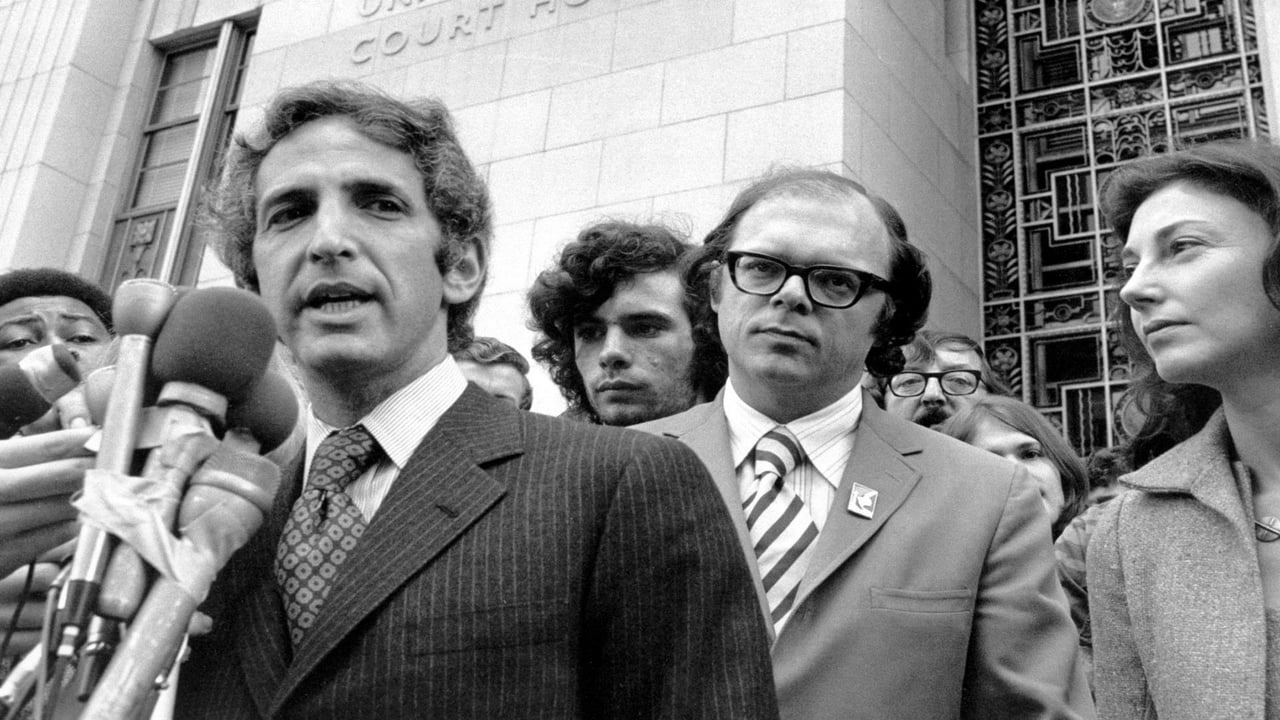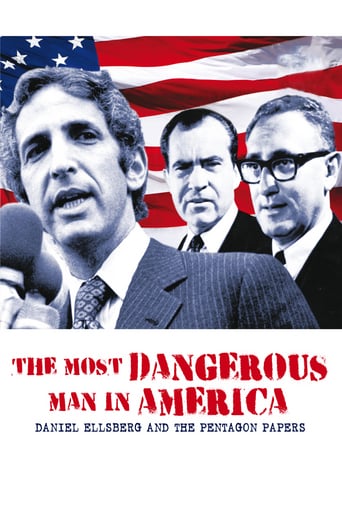

I like the storyline of this show,it attract me so much
... View MoreThe Worst Film Ever
... View MoreIt is interesting even when nothing much happens, which is for most of its 3-hour running time. Read full review
... View MoreThe film never slows down or bores, plunging from one harrowing sequence to the next.
... View MoreIf now we have Julian Assange and his feared Wikileaks to tells us the truth behind powerful organizations and their secrets we must thank that one day a man named Daniel Ellsberg who saw what's going wrong with another gigantic corporation named United States and its affairs during the Vietnam war and decided to be one of the most important characters in history by leaking to the press the infamous Pentagon Papers, a Top Secret study revealing the whole truth about what was really happening in Vietnam and the U.S. involvement in it since 1945.In "The Most Dangerous Man in America: Daniel Ellsberg and the Pentagon Papers" directors Judith Ehrlich and Rick Goldsmith interview Ellsberg and other people involved in Dr. Ellsberg's career and life before and after the Pentagon papers affair, from his work on RAND Corporation and his entrance working in the Pentagon under the command of Secretary of Defense Robert McNamara. After seeing how bad things were in Vietnam (and he was there himself), after plans and more plans of increasing conflicts and more attacks in Vietnam, seeing that his work was being perpetrated for wrong things Ellsberg changed his views of what he was doing; and after attending a protest against the war, he decided to do the right thing: show to the American public the truth about the war, what was going on in Vietnam and show that his country had nothing to do in there.The documentary establishes all the risk this guy went through, how he executed the leaking giving the study to Senators who were opposed to the war and to 17 newsgroups, starting with The New York Times who was censored by Nixon because of the publishing of the papers, and all the medias who tried to publish the papers was censored until the Supreme Court decided that the censorship was wrong. In less than two hours the movie displays lots of information without being boring or too much extensive, everything is very interesting to follow, very contrived and well put together (but the first minutes are a little bit slow, you have to be persistent to watch it). The most captivating part is when we see all the Ellsberg and his friend Daniel Russo crusade after they were charged of espionage, and the whole controversy about the publishing of the papers and that are still relevant today in a time where secrets can't be revealed otherwise there's always someone who'll try to impeach, to suffocate the freedom of speech, and the freedom of press; in a world where just simply stand for something and to have an opinion still it's too dangerous and might cause a war, and by war is mean not only the armed conflict, but the idealistic conflict, the words conflict. Here's a film that shows us the man behind the act; a David among thousands of Golias; a man who worked and defended his country and was accused by it at the same time while trying to protect the country interests and lives; a man who changed things and fought for the right thing, taking all the necessary and unnecessary risks for it and even obtained more than he wanted. This is a real story with real persons and it's a great story to be seen. 10/10
... View MoreI did not know much about Daniel Ellsberg before watching this movie. I think Daniel Ellsberg is more remembered because of the fact that the plumbers broke into his psychiatrist's office. The story of the Pentagon Papers is also known, but not as much. As can be seen in the film, the release of them did not have the kind of large impact one would expect.I never knew that Ellsberg had such a large influence of the implementation of the Vietnam War. I was always under the impression he had just been a pen pusher not making logistical decisions. I would have never guessed that he served in that country as a civilian.We see some other interesting facts about Ellsberg. I never knew that he was participating in peace rallies with Noam Chomsky and Howard Zinn. I didn't know he had an emotional sea change in his life after he heard about individuals going to prison to protest the war. It is a very interesting story.Besides that, the documentary is well put together. There aren't any interesting or outlandish cinematographic choices. The film is very basic in this respect. I think subject of the documentary carries more that the people involved in making it.
... View MoreSeen at Sydney Film Festival June 2010 in a giant picture palace from 1929, the State Theatre in Market St in Sydney centre. The director was present and gained much applause.All above comments are correct as to the content of the film. Great stuff.But further, the film is beautiful visually and aurally. No matter the absurdity or wickedness being discussed, the cinematographer and recordist have captured it with style and distinction.The cartoon moments are admittedly unnecessary, but everything else is top-rate, unlike so many current documentaries based on cheap video -- yes, Michael Moore's and dozens of others' -- so ugly as film in themselves.
... View MoreLet us all be eternally thankful that Daniel Ellsberg,a decorated Marine,working for the Rand Corporation in the 1960's had the inner vision to question the dangerous mindset of President Lyndon B. Johnson when he sent troops to South East Asia,in a country (at the time)nobody had even heard of before,the People's republic of Viet Nam to liberate the country from the (so called)Godless Communists that threatened our existence (or better,threatened Johnson's so called existence,despite the fact that Viet Nam had never even fired a shot at us). The war in Viet Nam was a war that was predicted America would never win,and did not,not however,before thousands of American troops were killed or maimed in various battles with the Viet Cong. In 1969,Ellsberg decided to take a calculated risk & make photo copies of top secret documents of the (then)Pentagon reports on America's involvement in Viet Nam. The papers were finally brought to attention to aspects of the mainstream media in 1971,and the flood gates opened (and opened up wide),at a time when Richard Nixon,who when elected a scant three years earlier,promised to bring American troops home (and not surprisingly,lied through his teeth,and did not,extending our involvement in Viet Nam for another seven years). All of this makes for one powder keg of a political thriller,for those who expect more from film. Judith Ehrlich & Rick Goldsmith co direct this well documented film,with testimony from those who were there,both currently still living,as well as those who have passed away over the years,from a script written by Judith Ehrlich & Michael Chandler. Cinematography by Vicente Franco & Dan Krauss,with editing by Michael Chandler,Rick Goldsmith & Lawrence Lerew. Featuring:Daniel Ellsberg,John Dean,Patrica Ellsberg,Bud Krogh, Tony Russo & Hendrick Smith,as well as the voices of Richard Nixon,Henry Kissinger,and others involved in the dirty dealings of war. Not rated by the MPAA,but contains horrific images & testimonies of the horrors of war,as well as some undeleted expletives from the mouth of Richard Nixon & others that some parents may,or may not want very young children to hear
... View More